- Home
- David Leavitt
The Two Hotel Francforts
The Two Hotel Francforts Read online
In memory of my father, Harold Leavitt
Contents
Map
Anywhere
Chapter 1
Chapter 2
Chapter 3
Chapter 4
Chapter 5
Chapter 6
Chapter 7
Chapter 8
Somewhere
Chapter 9
Chapter 10
Chapter 11
Chapter 12
Chapter 13
Chapter 14
Nowhere
Chapter 15
Chapter 16
Chapter 17
Chapter 18
Chapter 19
Chapter 20
Chapter 21
Chapter 22
Chapter 23
Chapter 24
Everywhere
Chapter 25
Chapter 26
Chapter 27
Chapter 28
Chapter 29
Chapter 30
Acknowledgments and Sources
A Note on the Author
By the Same Author
Map
Anywhere
Chapter 1
We met the Frelengs in Lisbon, at the Café Suiça. This was in June 1940, when we were all in Lisbon waiting for the ship that was coming to rescue us and take us to New York. By us I mean, of course, us Americans, expatriates of long standing mostly, for whom the prospect of returning home was a bitter one. Now it seems churlish to speak of our plight, which was as nothing compared with that of the real refugees—the Europeans, the Jews, the European Jews. Yet at the time we were too worried about what we were losing to care about those who were losing more.
Julia and I had been in Lisbon almost a week. I am from Indianapolis; she grew up on Central Park West but had dreamed, all through her youth, of a flat in Paris. Well, I made that dream come true for her—to a degree. That is to say, we had the flat. We had the furniture. Yet she was never satisfied, my Julia. I always supposed I was the piece that didn’t fit.
In any case, that summer, Hitler’s invasion of France had compelled us to abandon our Paris establishment and fly headlong to Lisbon, there to await the SS Manhattan, which the State Department had commandeered and dispatched to retrieve stranded Americans. At the time, only four steamships—the Excalibur, the Excambion, the Exeter, and the Exochorda—were making the regular crossing to New York. They were so named, it was joked, because they carried ex-Europeans into exile. Each had a capacity of something like 125 passengers, as opposed to the Manhattan’s 1,200, and, like the Clipper flights that took off each week from the Tagus, you couldn’t get a booking on one for love or money unless you were a diplomat or a VIP.
And so we had about a week to kill in Lisbon until the Manhattan arrived, which was fine by me, since we had had quite a time of it up until then, dodging shellfire and mortar fire all the way across France, then running the gantlet of the Spanish border crossing and contending with the Spanish customs agents, who in their interrogation tactics were determined to prove themselves more Nazi than the Nazis. And Lisbon was a city at peace, which meant that everything that was scarce in France and Spain was plentiful there: meat, cigarettes, gin. The only trouble was overcrowding. Hotel rooms were nearly impossible to come by. People were staying up all night at the casino in Estoril, gambling, and sleeping all day on the beach. Yet we were lucky—we had a room, and a comfortable one at that. Yes, it was all right with me.
Not with Julia, though. She loathed Portugal. She loathed the shouting of the fishwives and the smell of the salted cod. She loathed the children who chased her with lottery tickets. She loathed the rich refugees who had rooms at better hotels than ours and the poor refugees who had no rooms at all and the mysterious woman on our floor who spent most of every day leaning out her door into the dark corridor, smoking—“like Messalina waiting for Silius,” Julia said. But what she loathed most—what she loathed more than any of these things—was the prospect of going home.
Oh, how she didn’t want to go home! It had been this way since the beginning of the war. First she had tried to convince me to stay in Paris; then, when the bombs started dropping on Paris, to resettle in the South of France; then, when Mussolini started making noises about invading the South of France, to sail to England, which the Neutrality Act forbade us from doing (for which she would not forgive Roosevelt). And now she wanted to stay on in Portugal. Portugal! I should mention—I can mention, since Julia is dead now and cannot stop me—that my wife was Jewish, a fact she preferred to keep under wraps. And it is true, in Portugal there was no anti-Semitism to speak of, quite simply because there were no Jews. The Inquisition had taken care of that little problem. And so she had decided that this country in which she was so disinclined to spend a few weeks would be a perfectly agreeable place to sit out the rest of the war. For she had sworn, when we had settled in Paris fifteen years before, that she would never go home again as long as she lived. Well, she never did.
So that was how we came to be at the Suiça that morning—the Suiça, the café that, of all the cafés in Lisbon, we foreigners had chosen to colonize. We were sitting outdoors, having breakfast and watching the traffic go round the oval of the Rossio, and it was this notion of settling in Portugal that Julia was going on about, as I drank my coffee and ate a second of those delicious little flan-filled tartlets in which the Suiça specializes, and she laid out a hand of solitaire, which she played incessantly, using a special set of miniature cards. Slap-slap went the cards; natter-natter went her voice, as for the hundredth time she related her mad scheme to rent an apartment or a villa in Estoril; and as I explained to her, for the hundredth time, that it was no good, because at any moment Hitler might forge an alliance with Franco, in which case Portugal would be swallowed up by the Axis. And how funny to think that when all was said and done, she was right and I was wrong! For we would have been perfectly safe in Portugal. Well, it is too late for her to lord that over me now.
It was then that the pigeons swooped—so many of them, flying so low, that I had to duck. In ducking, I knocked her cards off the table. “It’s all right, I’ll get them,” I said to Julia, and was bending to do so when my glasses fell off my face. A passing waiter, in his effort to keep his trayful of coffee cups from spilling, kicked the glasses down the pavement, right into Edward Freleng’s path. It was he who stepped on them.
“Oh, damn,” he said, picking up what was left of the frames. “Whose are these?”
“They’re mine,” I said, from the ground, where I was still trying to collect the cards: no mean feat, since a breeze had just come up—or perhaps the pigeons had churned it up—and scattered them the length of the sidewalk.
“Let me help you with that,” Edward said, and got down on his knees next to me.
“Thanks,” I said. Seeing that the task was more than we could manage, several of the male patrons at the café, as well as several of the waiters, got down on their knees with us. Like commandos, we scrambled to gather up the cards, chasing down the ones that the breeze had batted out of reach, while Julia watched with a sort of paralyzed detachment. Of course, I understood—perhaps I alone understood—how much was at stake. For if four or five of the cards went missing, it would be unfortunate. But if just one went missing, it would be a catastrophe.
And miraculously, all of the cards were found—at which all of the men who had participated in the operation burst into spontaneous applause.
“Thanks,” I said to Edward—again.
“Why are you thanking me?” he said. “I’m the one who stepped on your glasses.”
“It wasn’t your fault.”
“No, it was the pigeons,” Iris Freleng said, from two table
s away.
“Some fool must have tried to feed them,” Edward said. “They’re ruthless, these birds. Piranhas of the air, the locals call them.”
“Do they?”
“They might as well. The word’s Portuguese.”
“Are they damaged?” Iris asked.
“Not much,” Julia said. “A few of the corners are bent.”
“I meant your husband’s glasses. Even so, I’m glad to hear it. I’ve never seen cards that small.”
“They’re special solitaire cards,” I said. “My wife is something of a connoisseur where solitaire is concerned.”
“I am not a connoisseur,” Julia said.
“The versions she plays require two decks, which is why the cards have to be so small. Otherwise you’d need a dining table to spread them out on.”
“How interesting,” Iris said. “Myself, I’ve never gone in for cards.”
“I am not a connoisseur,” Julia repeated, fitting the cards back into their box, on the alligator-skin surface of which the word PATIENCE was picked out in gold.
“Of course, we’ll pay to have them replaced,” Edward said. “The glasses.”
“It’s all right,” I said. “I have a spare pair at the hotel.”
“That’s lucky,” he said. “I mean, that you have a hotel.”
Then Iris suggested we join them at their table. After all the trouble Edward had caused, she said, the least they could do was buy us coffee.
“Or a drink,” Edward added.
I looked at Julia. Her expression was blank. “Very kind of you,” I said. But when I got up to make the short journey between the tables, I tripped.
“Steady on,” Edward said, catching me by the arm.
We all sat down together. We exchanged names. We looked one another over. From what I could tell, the Frelengs were roughly our age—the early forties. Iris wore her hair in a snood. She had a British accent, while Edward had the sort of uninflected American accent to which no regional identifiers attach themselves. His voice was soft and hard at once, like the noise of car tires on wet gravel.
They asked us where we were coming from and we told them Paris. And they?
“Oh, we’ve lived all over the place,” Iris said. “Nice, Bordighera, Biarritz. Then a few years ago we took a cottage in Pyla. That’s a little fishing village, just outside Arcachon.”
“Being so close to the Spanish border, we figured we could wait until the last minute to leave,” Edward said. “But when the last minute came, we only had five hours to pack and get out.”
“On top of which,” Iris said, “my passport—wouldn’t you know it?—was due to expire that day. That very day! The one that had my American visa in it. And so when we got to Bordeaux, first we had to go to the British consulate for the new passport, and then to the American consulate for the new visa, and all that before the Spanish consulate and the Portuguese consulate.”
“We were in Bordeaux, too,” Julia said. “At the Splendide, the manager was renting the armchairs in the lobby by the half hour.”
“The Red Cross shelter wouldn’t accept dogs.”
Suddenly Julia screamed and leaped to her feet.
“What’s wrong?” I asked, leaping up too.
“Something’s licking my leg.”
“Don’t worry, it’s only Daisy,” Iris said, and hoisted a wire fox terrier up from under the table. “You love the taste of moisturizing cream, don’t you, Daisy?”
“It scared me half to death,” Julia said. “Does it bite?”
“She’s fifteen,” Edward said. “Her biting days are past, I think.”
A delayed consciousness that she had just made a spectacle of herself stole over Julia, who sat down again hurriedly.
“You must excuse my wife,” I said. “She’s not used to dogs.”
“You mean you didn’t have dogs growing up?” Iris said.
“We had a poodle, but it was more my brother’s.”
“The remarkable thing about dogs,” Edward said, “is that when you get them they’re babies, and then before you know it they’re the same age as you are, and then they’re old. It’s like watching your children grow up to become your grandparents.”
“Daisy was a beauty in her time,” Iris said. “She could have been a champion if she hadn’t had a gay tail.”
“What’s a gay tail?” I asked.
“It means that the tail curves too much,” Edward said.
“Poor thing.” Iris arranged the dog in a sitting position on her lap. “You thought you were going to spend your dotage in a cottage by the sea, didn’t you? Well, so did we.”
Tears filled Iris’s eyes.
“Now it’s my turn to excuse my wife,” Edward said. “This whole business has been harder on her than she likes to let on. Not that it hasn’t been hard on everyone. You, for instance—”
“Us?” I said. “Oh, we’ve been lucky.”
“And just how is that, pray tell?” Julia said.
“Well, we’ve made it this far without getting killed, haven’t we? A ship’s coming to rescue us. And when you think what some of these poor devils wouldn’t give to have a ticket on that ship—”
“I’m sorry, but I don’t see why their having to leave their homes is any worse than our having to leave our homes,” Julia said.
“Oh, but it is,” Iris said. “Because we’ve got somewhere to flee to, haven’t we? Whereas all they have to look forward to is exile—that is, if they find a country willing to accept them.”
“But it’s exile for us, too,” Julia said. “France was our home, too.”
“All we are is interlopers,” Iris said. “Tourists who stayed on for a few years or a few decades.”
“That’s a bit harsh, isn’t it?” Edward said. “Why, that old lady we met the other day, Mrs. Thorpe—she’s lived in Cannes fifty years. She doesn’t have any people in the States, no money, nowhere to go.”
“At least it’s better than a concentration camp,” Iris said—at which Julia started a little. “No, the truth is, Daisy’s the only real European here. Why, do you know what people keep coming up to ask me? If she’s a schnauzer! Imagine that, mistaking you for a Hun dog!”
“Though of English stock, Daisy was born in Toulouse,” Edward said. “The product of a morganatic marriage between a British champion and a French peasant girl.”
“Champion Harrowhill Hunters Moon,” Iris said.
Daisy had now put her front paws up on the table. Very delicately, she pulled a roll off a plate and nibbled at it. “That reminds me,” Iris said. “We’ve got that appointment with the vet at eleven. It’s nothing serious,” she added, to Julia, who was sitting as far back in her chair as possible, “only her feces haven’t been terribly solid and I’m thinking she might have worms. There’s a certain kind that look like grains of rice. Then again, she’s been eating rice.”
Julia went very pale.
“But, darling,” Edward said, “don’t you think we ought to first help Mr. Winters back to his hotel, so he can fetch his spare glasses?”
“Oh, of course,” Iris said. “How rude of me.”
“Please don’t worry,” I said. “I’ll be fine.”
“Nonsense,” Julia said. “You’re blind as a bat without your glasses.”
“Where are you staying?” Edward said.
“The Francfort,” Julia and I said in unison.
“But how funny,” Iris said. “So are we.”
“You must be at the other one,” Edward said. “Otherwise we would have seen you.”
“The other one?”
“There are two—the Hotel Francfort, which is over by the Elevator, and the Francfort Hotel, which is right here, next to the café.”
“We’re at the one by the Elevator,” I said.
“That’s the nicer one. You know, it’s become a running joke among the foreigners. ‘Just think, here we are fleeing the Germans, and we end up at a hotel called Francfort.’”
Iris
looked at her watch. “Tell you what, Eddie,” she said, “why don’t you walk Mr. Winters back to his hotel—”
“The blind leading the blind, right?”
“—and perhaps Mrs. Winters can come with me to the vet?”
“Me?”
“You don’t mind, do you? I’d so appreciate it. If nothing else, the company. If I’m to be honest, I’m sick to death of spending all my time with Eddie. No offense, darling.”
“None taken.”
“But I’m terrible with dogs,” Julia said. She looked to me for rescue.
“Sounds like a good idea to me,” I said.
“I’ll get the check,” Edward said.
“How could you?” Julia mouthed at me. But I pretended not to see.
I was blind as a bat, wasn’t I?
Chapter 2
We put Iris, Julia, and Daisy into a taxi. Julia got in first. Then Iris handed her the dog. Until that moment, I hadn’t noticed how tall Iris was, especially compared with Julia, who was only five foot one. Just to fit into the taxi, Iris had to fold herself up like a penknife.
Holding out his arm to stop traffic, Edward led me across the street. I was almost giddy with relief and gratitude—to him, and also to Iris, who had just done me the great favor of taking Julia off my hands for a while. For the past weeks had been arduous, and Julia—well, the kindest thing to say would be that she had done little to make them less so. Just getting her to eat was an effort. At home she never ate much, and now she was eating virtually nothing. Nor did she care for our room at the Francfort, though it was paradise compared with some of the places we had slept during our trip: squalid hotels, barns, one night on the floor of a rural French post office, several nights in the car. I don’t want to suggest that Julia was incapable of coping with adversity. On the contrary, I have no doubt but that, had the journey been one she was keen to be making, she would have gladly put up with all manner of discomfort. But the journey was not one she was keen to be making, and so each bed, each dinner, each toilet was an ordeal.
“Do you think they’ll have lunch?” I asked Edward. “Our wives, I mean?” I was hoping that Iris might succeed where I had failed, get Julia to eat a square meal for once and, in so doing, buy me a few more hours of freedom.

 Shelter in Place
Shelter in Place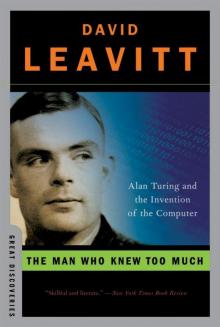 The Man Who Knew Too Much: Alan Turing and the Invention of the Computer (Great Discoveries)
The Man Who Knew Too Much: Alan Turing and the Invention of the Computer (Great Discoveries)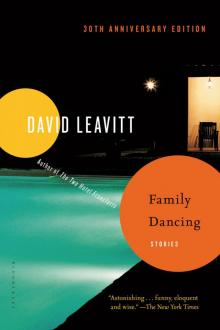 Family Dancing
Family Dancing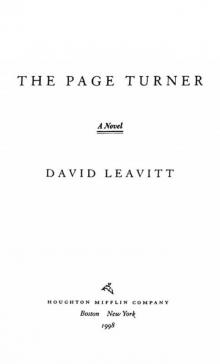 Page Turner Pa
Page Turner Pa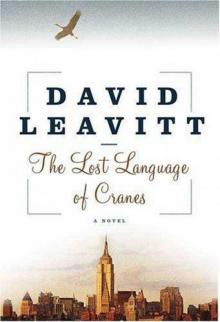 The Lost Language of Cranes: A Novel
The Lost Language of Cranes: A Novel The Body of Jonah Boyd
The Body of Jonah Boyd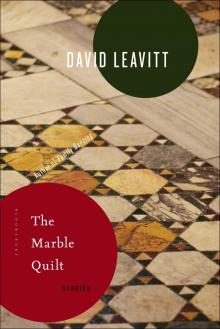 The Marble Quilt
The Marble Quilt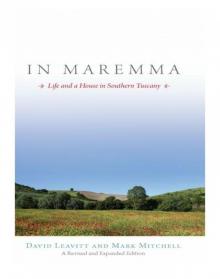 In Maremma
In Maremma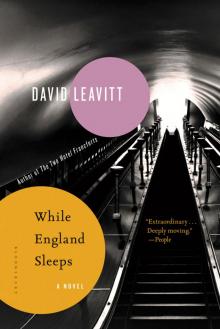 While England Sleeps
While England Sleeps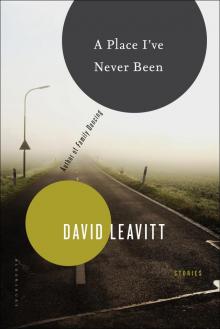 A Place I've Never Been
A Place I've Never Been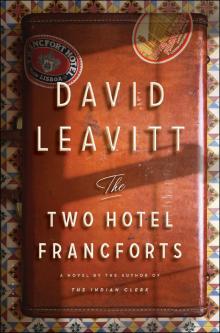 The Two Hotel Francforts
The Two Hotel Francforts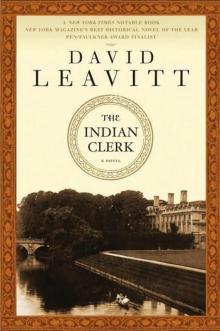 The Indian Clerk
The Indian Clerk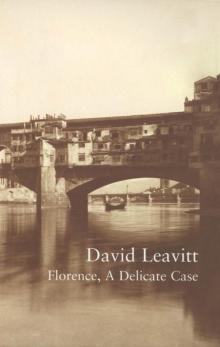 Florence
Florence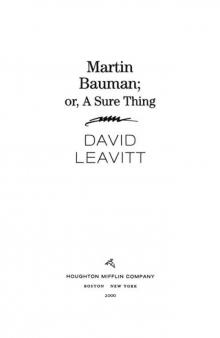 Martin Bauman
Martin Bauman Equal Affections
Equal Affections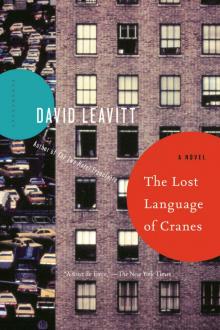 The Lost Language of Cranes
The Lost Language of Cranes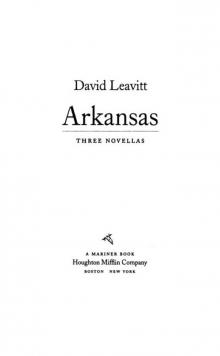 Arkansas
Arkansas